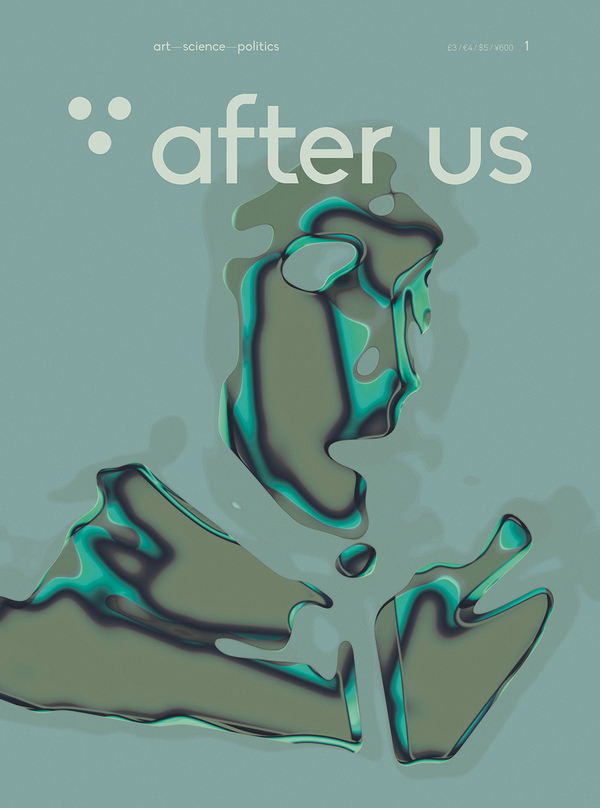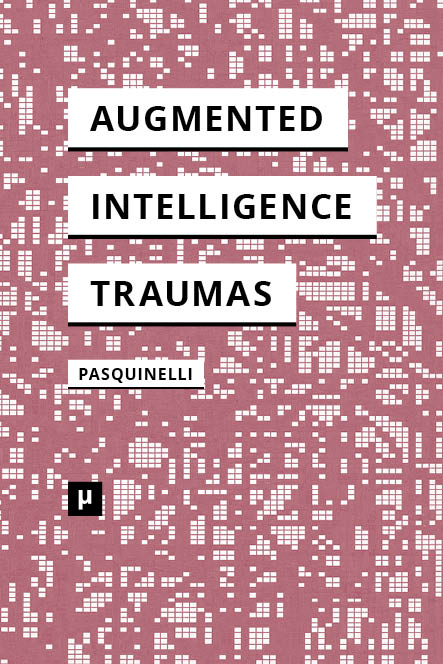After Us: Art—Science—Politics, 1 (2015) [English/Spanish]
Filed under magazine | Tags: · accelerationism, aesthetics, art, artificial intelligence, machine, politics, science fiction

“Through essays, pictorials and fiction, After Us hopes to look beyond the horizon, exploring developments in science and technology, new forms and expressions in art, and alternative political thinking. In print and online.”
Contents: Essays by Nora N. Khan on artificial superintelligence, Liam Young on architecture for machines, Nick Srnicek on neoliberalism and aestheticism, Benedict Singleton on modern film archetypes. Interview with Walter Murch by Dave Tompkins. Fiction by Juan Mateos. Art by Timothy Saccenti & Sam Rolfes, Lawrence Lek. Illustrations by Stathis Tsemberlidis, Adam Ferriss, Alex Solman, Patrick Savile.
Publisher Optigram, London, Sep 2015
32 pages
HTML (English, use menu to browse contents)
PDF (English, 10 MB)
HTML (Spanish, expand menu item “translations” to browse contents)
See also Issue 2.
Comments Off on After Us: Art—Science—Politics, 1 (2015) [English/Spanish]Charles Stross: Accelerando (2005)
Filed under fiction | Tags: · artificial intelligence, biotechnology, posthuman, science fiction, technological singularity, technology

“The Singularity. It is the era of the posthuman. Artificial intelligences have surpassed the limits of human intellect. Biotechnological beings have rendered people all but extinct. Molecular nanotechnology runs rampant, replicating and reprogramming at will. Contact with extraterrestrial life grows more imminent with each new day.
Struggling to survive and thrive in this accelerated world are three generations of the Macx clan: Manfred, an entrepreneur dealing in intelligence amplification technology whose mind is divided between his physical environment and the Internet; his daughter, Amber, on the run from her domineering mother, seeking her fortune in the outer system as an indentured astronaut; and Sirhan, Amber’s son, who finds his destiny linked to the fate of all of humanity.
For something is systematically dismantling the nine planets of the solar system. Something beyond human comprehension. Something that has no use for biological life in any form…”
Publisher Ace Books, New York, July 2005 / Orbit Books, London, August 2005
Creative Commons Attribution-NonCommercial-NoDerivs 2.5 License
ISBN 0441012841 / 1841493902
390 pages
Matteo Pasquinelli (ed.): Alleys of Your Mind: Augmented Intelligence and Its Traumas (2015)
Filed under book | Tags: · algorithm, artificial intelligence, brain, cognition, computation, cybernetics, technology, thinking

“One day, it will not be arbitrary to reframe twentieth century thought and its intelligent machines as a quest for the positive definition of error, abnormality, trauma, and catastrophe—a set of concepts that need to be understood in their cognitive, technological and political composition. It may be surprising for some to find out that Foucault’s history of biopower and technologies of the self share common roots with cybernetics and its early error friendly universal machines. Or to learn that the desiring machines, which “continually break down as they run, and in fact run only when they are not functioning properly” (Deleuze and Guattari), were in fact echoing research on war traumas and brain plasticity from the First World War. Across the history of computation (from early cybernetics to artificial intelligence and current algorithmic capitalism) both mainstream technology and critical responses to it have shared a common belief in the determinism and positivism of the instrumental or technological rationality, to use the formulations of the Frankfurt School. Conversely, the aim of this anthology is to rediscover the role of error, trauma and catastrophe in the design of intelligent machines and the theory of augmented cognition. These are timely and urgent issues: the media hype of singularity occurring for artificial intelligence appears just to fodder a pedestrian catastrophism without providing a basic epistemic model to frame such an “intelligence explosion”.”
With texts by Benjamin Bratton, Orit Halpern, Adrian Lahoud, Jon Lindblom, Catherine Malabou, Reza Negarestani, Luciana Parisi, Matteo Pasquinelli, Ana Teixeira Pinto, Michael Wheeler, Charles Wolfe, and Ben Woodard.
Publisher meson.press, Lüneburg, November 2015
Creative Commons BY-SA 4.0 License
ISBN 9783957960658 (print) 9783957960665 (PDF)
212 pages

